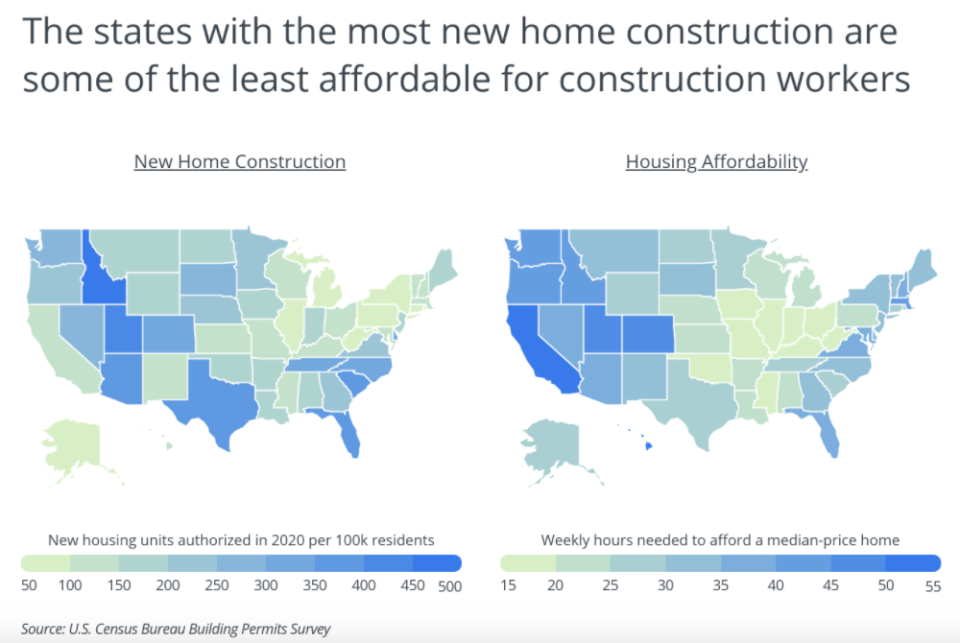Construction workers are priced out of homeownership in surprising areas of the US
Construction workers can’t typically afford the houses they build in pricey states like California and New York, but houses are also unaffordable in the historically inexpensive states of Utah and Idaho, according to a new study.
The Mountain states are among the least affordable areas for construction workers to buy a home in 2020, as rising home prices outpace wage growth amid renewed interest in outdoor living during the coronavirus pandemic, according to a study by Porch.com, a Seattle-based home services company.
“It’s interesting that the homes that a lot of these workers or cities that these construction workers are helping develop can be so expensive that they can get priced out,” said Kyle Fretwell, a communication representative for Porch.com and founder of Lattice Publishing.

Contractors in Utah get paid about $21.54 an hour and would need to work 44 hours a week to afford the median priced $368,630 home in the state. And the average Idahoan construction worker is paid $18.93 an hour — they would need to work 46.7 hours a week to buy a typical home priced at $307,135 in the state, according to the study.
“States with the most new homes are some of the least affordable because the country is building homes in areas where individuals are looking to move,” said Fretwell, adding that prices are so high because “supply is struggling to keep up with demand.”
Construction wages may be higher in states where homes are more valuable, but in many cases the cost of living is so high that homeownership is out of reach for construction workers. A worker in California would need to work 58 hours a week to afford a typical home (median sale price of $580,473), compared to West Virginia, where workers could buy a typical home for $107,751 with only 13 hours a week of work. Florida and Massachusetts were also among the least affordable states for construction workers.
“A lot of it has to do with other occupations in the area that might be higher paying,” said Fretwell. In Silicon Valley, “the tech industry has some of the highest wages in the country and brings up the wages of the entire area. There is a lot of demand [in San Francisco and San Jose], and housing supply has not kept up with job opportunities and rising wages,” said Fretwell.
Construction wages have grown more slowly than average U.S. wage growth over the past two decades, the Porch.com study found — a surprising fact given that construction labor is so in-demand. According to the U.S. Bureau of Labor Statistics (BLS), in 2000 the median wage for full-time construction workers was $580 per week, compared to $575 per week for all full-time workers. As of January 2019, the median wage for construction workers was $866 per week compared to $917 for all workers, signaling a slowdown in construction wage growth.
Available construction jobs have outpaced construction labor for over a decade, and a quarter of contractors reported labor shortages at the beginning of the pandemic, according to the Associated General Contractors of America. Construction labor costs were developers number one complaint in 2020, according to PwC, a London-based professional services network.
“One possible cause for that [slow wage growth] is that the workers in ‘08 who dropped out of the industry, it might have been more experienced individuals who were the ones who exited,” causing overall wage averages to sink, said Fretwell.
Sarah Paynter is a reporter at Yahoo Finance.
Read the latest financial and business news from Yahoo Finance
Follow Yahoo Finance on Twitter, Facebook, Instagram, Flipboard, SmartNews, LinkedIn, YouTube, and reddit.
More from Sarah:
Barbara Corcoran: Housing market is hot, election results won’t matter
This startup allows you to custom build your home virtually
Millionaires aren’t selling their luxury homes in the city: Coldwell Banker



